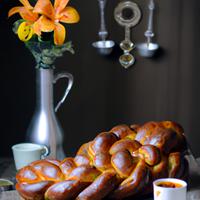
1 serving (60 grams) contains 210 calories, 5.4 grams of protein, 6.0 grams of fat, and 30.0 grams of carbohydrates.

Log this food in SnapCalorie

Nutrition Information
Calories |
840 | ||
|---|---|---|---|
% Daily Value* |
|||
| Total Fat | 24 g | 30% | |
| Saturated Fat | 6 g | 30% | |
| Polyunsaturated Fat | 0 g | ||
| Cholesterol | 120 mg | 40% | |
| Sodium | 888 mg | 38% | |
| Total Carbohydrates | 120 g | 43% | |
| Dietary Fiber | 4.8 g | 17% | |
| Sugars | 19.2 g | ||
| protein | 21.6 g | 43% | |
| Vitamin D | 0 mcg | 0% | |
| Calcium | 72 mg | 5% | |
| Iron | 6 mg | 33% | |
| Potassium | 288 mg | 6% | |
* Percent Daily Values are based on a 2,000 calorie diet. Your daily values may be higher or lower depending on your calorie needs.
Food Attributes
Source of Calories
About Challa bread
Challah bread is a traditional Jewish braided bread commonly enjoyed during Shabbat and holidays. It originates from Eastern European Jewish cuisine and is known for its soft, fluffy texture and slightly sweet flavor. Made from basic ingredients like flour, water, eggs, honey or sugar, yeast, and oil, its golden crust is often achieved with an egg wash before baking. Nutritionally, challah is a good source of carbohydrates, providing energy, but also contains fat due to the inclusion of eggs and oil. Some recipes may use whole-grain flour for added fiber, but traditional challah is typically made with refined flour, which is lower in nutrients than whole-grain options. Health-conscious bakers occasionally opt for less sugar or alternative sweeteners. While its rich taste and cultural significance are celebrated, moderation is key, as challah is calorie-dense and best enjoyed as part of a balanced diet.



